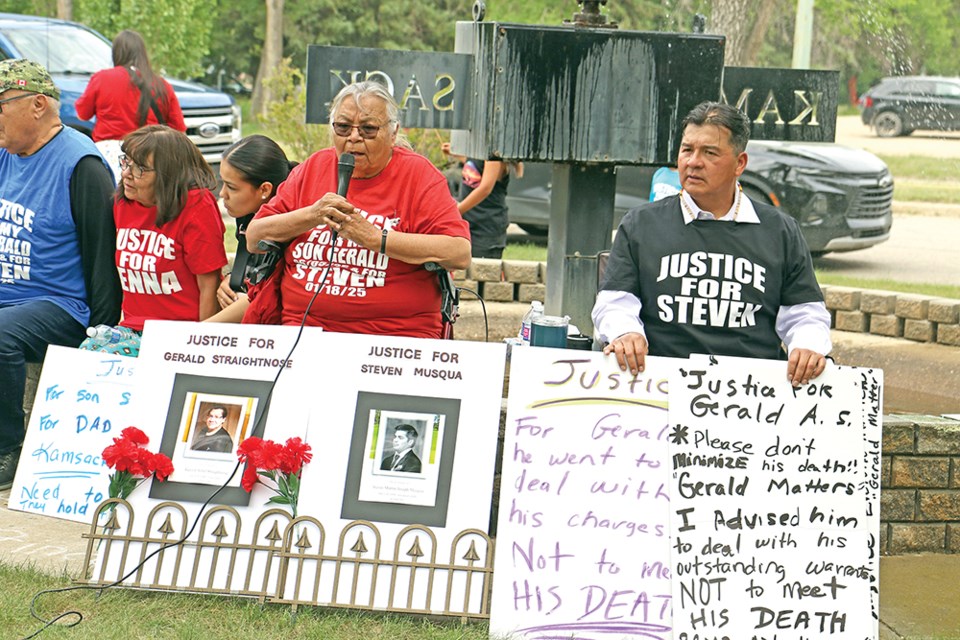KAMSACK — After a man died in the custody of the Kamsack RCMP, a family is looking for answers and a community is demanding change.
Gerald Straightnose was found unresponsive by a cell guard at the Kamsack detachment on June 5, according to the Saskatchewan RCMP. EMS then determined he was deceased.
Police said that Straightnose was wanted on multiple outstanding warrants. He had made a court appearance on June 4 and was set to reappear June 6.
“He had charges that led back from years ago, and he wanted to deal with them in order for him to get his licence back, so he gave himself up willingly to the police. Unfortunately, it led to his death,” said Thelma Severight, Straightnose’s aunt.
Severight was the master of ceremonies of a press conference held July 11 behind the cenotaphs of Keeseekoose, Cote and The Key First Nations, in view of the Kamsack RCMP detachment. The event not only featured Straightnose’s family, but also included the chiefs from Keeseekoose, Cote and The Key; Bobby Cameron, the chief of the Federation of Sovereign Indigenous Nations; Isabelle O’Soup, the chief of the Yorkton Tribal Council; and others that said their family members died after incidents connected with the Kamsack RCMP.
Straightnose’s family members held signs that said, “I advised him to deal with his outstanding warrants, not to meet with his death.”
The family said that Straightnose was heard by another in the RCMP detachment asking for food, medicine and a blanket before his death.
“There was no reason for him to die on a cement floor,” Severight said. “I want justice, and this is just the beginning for us. We're not going to stop here. We're going to keep on until we get that justice and get it out exactly what happened.”
Straightnose’s family said he was a caring father and grandfather that was facing problems stemming from addiction.
“He was a leader in his community for about 60 years,” Severight said. “He was a band councillor. He was a hunter. He always hunted and gave food to the community members, his family members. He took food to our traditional ceremonies. He was always there for the people.”
The Saskatchewan Serious Incident Response Team (SIRT), an independent, civilian-led unit responsible for investigating serious incidents involving the RCMP, has launched an investigation into the death. A report will be issued to the public within 90 days of the investigation ending. A community liaison will also be appointed, as required by The Police Act.
Severight said the SIRT investigation isn’t enough.
“We don't trust anybody right now at all. We don't trust their watchdogs. We don't trust nobody. There's no trust there. That trust is all gone.”
The family called for the Saskatchewan Coroners Service, an independent agency tasked with leading investigations into circumstances surrounding sudden, unexpected and unnatural deaths, to conduct its own investigation.
Chief Bobby Cameron of the Federation of Sovereign Indigenous Nations said they stood behind the families present at the event.
“We want to say again to the families here who are still healing, who are still grieving for their loved ones, that our prayers are still with you, that we're going to be with you until we see this through. We will go the distance for the families in their [quest for] truth and answers, for justice.”
Calls for systemic change
A key desire expressed by everyone who spoke at the conference was to call for changes to the police and prison system to prevent a similar situation in the future, to prevent undue danger for Indigenous people as they interact with the system.
A call was made to have First Nations liaisons imbedded in RCMP detachments.
“That's a really good action item. In fact, we're going to push it here with our commissioner at the F division [the RCMP division responsible for Saskatchewan], but also nationally,” Cameron said.
“I think that's a really good move. You have one of our own sitting in there to ensure those that come into the jail cells are properly taken care of.”
Another suggestion was to remove everybody working at the Kamsack RCMP detachment and replace them with Indigenous officers.
The chiefs of Keeseekoose and Cote said they are also looking at establishing their own police forces.
“Right now, we're in the process of building a partnership with the Fort Qu’Appelle Tribal Council,” said Chief George Cote of the Cote First Nation. They have a police force in their communities, so we're trying to have a detachment in Cote.”
The chief said it was still in the discussion stage and would take years to become reality if it went ahead.
Chief Alvin Musqua of Keeseekoose First Nation had similar sentiments
“We haven't really gone down that route yet, but things like this are going to be triggering stuff like that for us in our community.”
Musqua said that his experience is the RCMP only meet with his nation’s leadership around once a year.
“I believe that we need to seek other ways to improve the justice in our community, and we as a council, we're talking about exploring those options of First Nations policing.”




